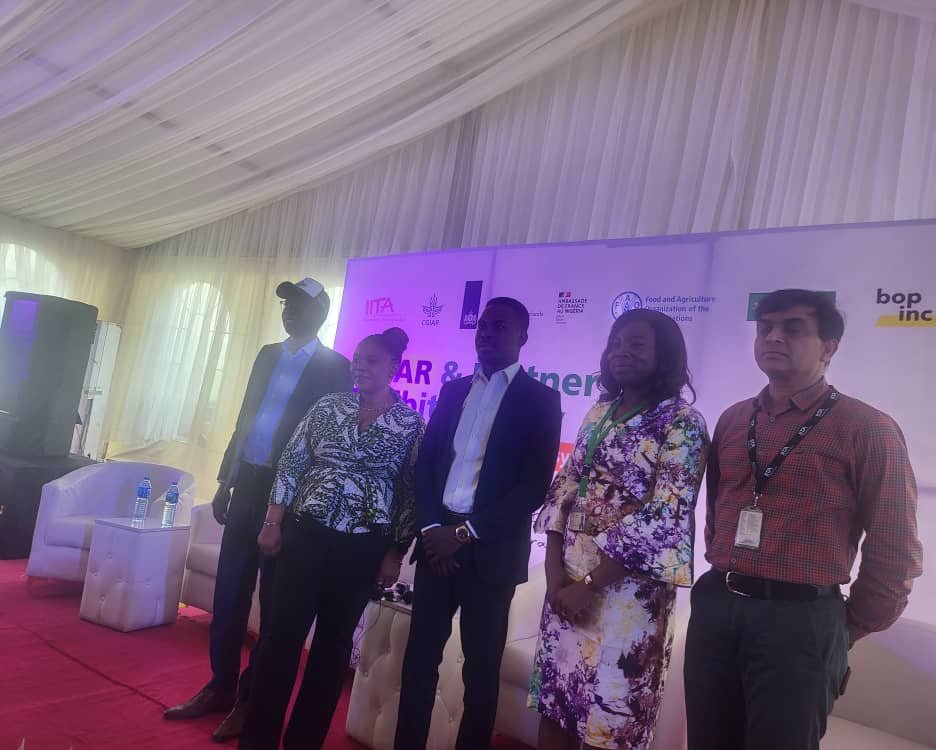By Bukola Adewumi
International partners and agricultural stakeholders have called for the scaling up of innovation for food system transformation to address food insecurity and malnutrition.
Al-Hasssn Cisse, Head, Food and Agricultural Organisation(FAO), Northeast Sub Office, made the call at the Consortium of International Agricultural Research Centers(CGIAR) and Partners Exhibition and Open Day to mark the 2023 World Food Day on Thursday in Abuja.
Cisse said the World Food Day was an occasion for raising awareness not only for the decision makers, but for all stakeholders including the farmer themselves, the civil society, private sector and technical organisations.
The News Agency of Nigeria (NAN) reports that the World Food Day is been celebrated Oct. 16 yearly.
The theme for this year celebration is, “Water is Life, Water is Food, Leave no One Behind.’’
He said the aim of scaling up innovation was to work with the community and develop policy for responsible use of the water for the benefit of all in the context of climate change as it affected food production.
According to him, it is estimated that by 2050, the world population will be about nine billion people; hence the need to explore other ways of transforming food system by putting into consideration climate change as it affects agriculture.
“We cannot continue to do as we used to do; it means that we have to transform our food system to the point of consumption; there is need to harvest rainfall for dry season farming.
“We need to find new way of adapting to the climate change, and make sure that the population is socially, culturally and environmentally acceptable by meeting the needs of the people.
“We need all stakeholders including the government, donors, technical organisation, the farmer and private sector to work together in other to achieve food security.’’
Cisse said that FAO was working with state governments to advise and support them on policy design as well as supporting the community in the field.
“At FAO our biggest programme is support Borno and Adamawa governments to have climate smart agriculture profile, and also Climate Smart Agriculture Investment Plan.
“ It contains all elements that are needed to do to deal with the climate change and its effect on the future population,’’ Cisse said.
He said there was need for up scaling innovation to help fighting against food insecurity and malnutrition.
On her part, Ms Aline Mugisho, CGIAR Country Convener, Nigeria, said there was need to make agriculture attractive to encourage youths by putting in place mechanised tools which involved digital technologies to accelerate food system transformation.
“Our goal is reaching Zero Hunger by 2023; we are complementary in the way in which we operate with FAO; we produce the innovations; FAO works directly with farmers to make sure that we catalyse those innovations.
“We produce seeds; FAO needs to approve those seeds and get them to the farmers timely,’’ she said.
According to her, there is need to factor in climate smart agriculture and ensure that the aspects of climate change that are impacting the result of food system of farming and food production are mitigated.
Dr Kumar Lava, Head Germplasm Health Unit, International Institute of Tropical Agriculture (IITA), said that the institute had different innovations that had been tested and proven to be effective to transform the agricultural food system.
According to him, the most important thing needed by farmers is the applicable use of right information that will help farmers get the best out of what they do.
He said that scaling up innovation in the food system was very important in transforming agriculture.(NAN)
Edited by Chijioke Okoronkwo












